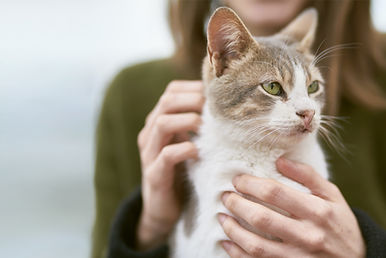Animal assisted services - AAS
Animal assisted education - AAE
Animal assisted treatment - AAT
Animal assisted support preograms - AASP
Definition (IAHAIO whitepaper):
An Animal Assisted Services is a goal oriented and structured services that intentionally includes or incorporates animals in health, education and human services (e.g., social work) for the purpose of therapeutic gains in humans.
It involves people with knowledge of the people and animals involved. Animal assisted services incorporate human-animal teams in formal human services such as Animal Assisted Treatment (AAT), Animal Assisted Education (AAE) or under certain conditions Animal Assisted Support Programs (AASP). Such services should be developed and implemented using an interdisciplinary approach.
Our AAS courses
Animal assisted services
DOG
Dogs are the most common animal in AAS. They are perfectly suited for a variety of environments, they are trainable to be obedient and to do many activities and most are also highly social and enjoy human touch and companionship.
Animal assisted services
CAT
Cats are quiet, clean, neat, calm and they often love to lie in someones lap. Cats are playful and can be trained just as dogs to do tricks and several activities. They are easy to take to different environments and people that don't like dogs can very often enjoy the company of a cat.
Animal assisted services
FARM
Farms are versitile and can offer a broad range og services to any age group. Tending to the animals and doing certian chores can give routine and a sense of purpose. Collaborating with others on the farm gives social exposure. A variety of animals gives a more stimulating environmemt and more options.
Animal assisted services
HORSE
Horses are known to mirror human emotions. Horses also offer a variety of activities. Tending to the horse, like feeding, cleaning the stables, grooming, training the horse and riding. Horses have a long history as therapy animals and can benefit any age group.
Animal welfare
JUNIOR
It's important to educate children about the animals they love and live with. Most children have respect for their family pets and want to do right by them, but to do that they need knowledge. When children learn to understand animals they also improve their social abilities and empathy.
Why it is important to test AAS animals
This is important to ensure animal welfare, minimize risks, and enhance the quality of services. Owners of pets are not qualified to determine wether their animal is suitable for AAS. Owners can misinterpret the animals behaviors and unintentionally put the animal in situations and environments that are stressful. Animals working in AAS should be enriched by their experiences, the same way we are.
Animals that thrive in human interaction will have an increased health-promoting effect.











